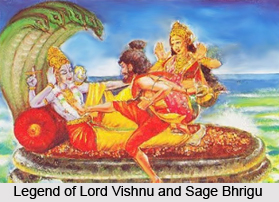 The legendary tale of Lord Vishnu and Sage Bhrigu confirms the all pervading Lord Vishnu to be more among the trinity, Lord Brahma, Lord Shiva and Lord Vishnu. His virtues and qualities of being merciful, companionate, loving and possessing tender thoughts makes him more celebrated among his devotees. A fascinating tale underlines the ever loving, kind, polite and forgiving nature of the Lord.
The legendary tale of Lord Vishnu and Sage Bhrigu confirms the all pervading Lord Vishnu to be more among the trinity, Lord Brahma, Lord Shiva and Lord Vishnu. His virtues and qualities of being merciful, companionate, loving and possessing tender thoughts makes him more celebrated among his devotees. A fascinating tale underlines the ever loving, kind, polite and forgiving nature of the Lord.
Once, the deities residing in heaven and the rishis appealed sage Bhrigu to determine the amiable qualities of the gods with a view to deciding who deserved their worship.
Bhrigu first approached Lord Brahma, the creator of the universe. Brahma was then busy conversing with his followers and eulogising his own greatness as he carried the Vedas. He thus, did not welcome sage Bhrigu with the customary respect and reverence with which a Brahmin is received. Bhrigu thus, did not consider him worthy of worship and even cursed him.
Next, the sage visited Lord Shiva and waited for his approach for a long duration, but did not get the opportunity to meet the god of Destruction, as he was then engaged in an amorous sport with his holy consort, Parvati. Upon waiting for a long time, Bhrigu, who was identified for his impatience and vindictive nature, cursed Lord Shiva to possess the qualities of darkness and said that as he was more interested in copulation he would be worshipped in his phallic symbol, the organ of generation.
Thus, having rejected both, Lord Brahma and Lord Shiva, Bhrigu went to visit Lord Vishnu. Vishnu was then fast asleep and his consort Goddess Lakshmi was sitting beside him and attending him. To test Vishnu patience and tender nature, Bhrigu kicked the sleeping god on the chest with his foot. His provoked Vishnu to raise from his sleep but instead of losing his temper as Bhrigu expected him to, he took Bhrigu`s foot in his hand and gently pressed it enquiring whether he was hurt. He then proceeded to ask him if there was any service he could render to him. Bhrigu was greatly moved and impressed by the humility and modesty of the god. He took no time to decide that he alone among the trinity of gods deserved to be worshipped, loved and venerated.









